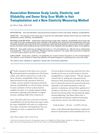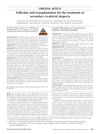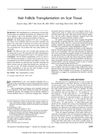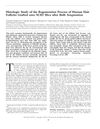Anagen Hair Follicles Transplanted Into Mature Human Scars Remodel Fibrotic Tissue
January 2023
in “
npj regenerative medicine
”
anagen hair follicles fibrotic tissue tissue regeneration epidermal thickness epidermal-dermal junction dermal cell density blood vessel density collagen type I fibers cytokine environment TGFβ1 IL13 IL-6 hair follicles scar tissue skin regeneration skin thickness skin layers cell density blood vessels collagen cytokines transforming growth factor beta 1 interleukin 13 interleukin 6

TLDR Transplanting growing hair follicles into scars can help regenerate and improve scar tissue.
In a pilot clinical study, researchers investigated whether transplanting anagen hair follicles into human scars could promote tissue regeneration and remodel fibrotic tissue. The study involved collecting full-thickness skin biopsies from scars before and after hair follicle transplantation. Results indicated that the transplantation led to increased epidermal thickness, improved interdigitation at the epidermal-dermal junction, higher dermal cell and blood vessel density, and remodeled collagen type I fibers, which resulted in a reduced total collagen fraction, fewer thick fibers, and less alignment. Additionally, there was a notable shift in the cytokine environment within the scars, including a sustained inhibition of pro-fibrotic factors such as TGFβ1, IL13, and IL-6. These findings suggest that anagen hair follicles have the potential to reduce the fibrotic characteristics of scars, offering promising insights for the development of regenerative treatments for mature scars.


















